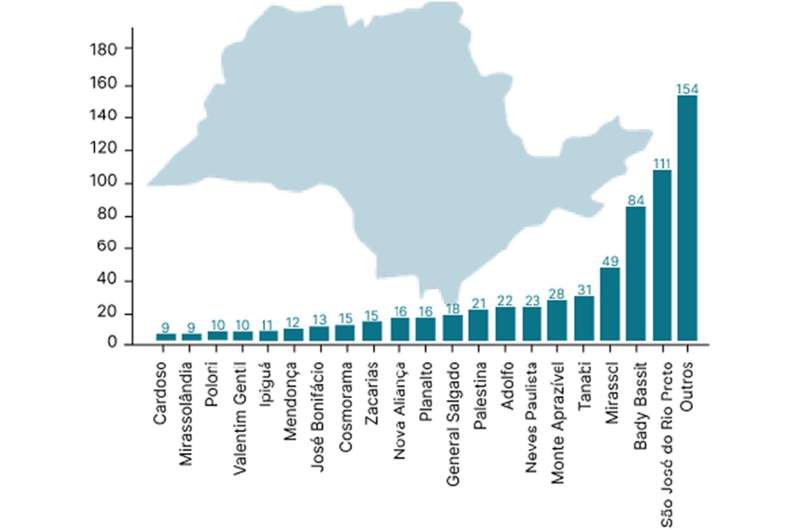This article has been reviewed according to Science X's editorial process and policies. Editors have highlighted the following attributes while ensuring the content's credibility:
fact-checked
peer-reviewed publication
trusted source
proofread
Most patients treated by public psychiatric outpatient clinics are women aged 45 on average, Brazilian study finds

More than 75% of the patients treated at the psychiatric outpatient clinic of Hospital de Base in São José do Rio Preto, São Paulo state (Brazil), are women with a mean age of 45 and suffering from sadness, anxiety, and irritability, according to a study reported in the journal Frontiers in Psychiatry.
The findings, which are compatible with data in the Brazilian and global literature, draw attention to the importance of diagnosing and treating mental disorders and can help formulate public policy for the health care sector.
"The reality observed in São José do Rio Preto is similar to the situation in psychiatric outpatient clinics belonging to the public health service on the regional and national levels," said Gerardo Maria de Araújo Filho, a professor in the Department of Neurological Sciences, Psychiatry, and Medical Psychology at the São José do Rio Preto Medical School.
Mental disorders are lowering the quality of life and impairing work capacity with increasing frequency worldwide. They affect 20% of the adult population in Brazil, according to the Ministry of Health; they are severe and persistent in 3% of cases and due to alcohol and drug abuse in 6%. In addition, 12% require continuous or recurring care. Nevertheless, only 2.3% of the annual budget of the SUS (Sistema Único de Saúde, Brazil's national health service) is allocated to the treatment of mental illness.
"Improving the identification of clinical and epidemiological characteristics is a key step to establish more efficient protocols, develop public policy, and promote improvements in services," Araújo said.
The group of researchers led by Araújo analyzed electronic medical records for 8,384 clinical appointments that took place between March 2019 and March 2021 at the psychiatric outpatient clinic of São José do Rio Preto's Hospital de Base, which offers multidisciplinary treatment for psychiatric patients in the northwest of São Paulo state and serves as the public referral service for 2 million inhabitants of 102 municipalities in the region.
The analysis showed that the patients concerned were mostly female, averaging 45 years of age, and diagnosed with generalized anxiety. The most frequently recorded symptoms were sadness, anxiety, and irritability. The most prescribed medications were selective serotonin reuptake inhibitors (SSRIs), a class of antidepressants such as sertraline.
"We found most to be housewives suffering quite badly from depression and anxiety, and this once again raises the issue of women's cumulative roles and functions. It's also important to note that this is a high-risk group for mental disorders inasmuch as the victims of domestic violence are women more often than men," Araújo said.
"Another key point is that women more often seek medical and psychological care than men, who mostly hide any mental health problems they may have, not least via alcohol and drugs," said Cinara Cássia Brandão, a professor in the Department of Molecular Biology at FAMERP and a co-author of the article.
The analysis also showed a predominance of women (78.86%) with anxiety and depressive disorders in the generalized anxiety group. However, schizophrenia was frequent among the men (59%), as were delusional disorder (57.89%), alcohol abuse (70%), and illicit substance abuse (60%).
Mean disease and treatment duration were about 15 and 9 years, respectively, for men and women taken together. For women only, the means were 14 and 9 years, while for men, they were 18 and 8 years.
The diagnosis with the longest mean duration of illness was bipolar affective disorder (hypomanic episode, a less severe form of mania characterized by elevated mood with enhanced sociability, initiative, and energy), lasting about 29 years. Moderate depressive episodes were the shortest, lasting about 10 years.
With regard to prescribed drugs, the mean was four per patient at the last visit. The highest means were for patients with bipolar affective disorder, current manic episodes with psychotic symptoms, and organic delusional disorder.
Protective network
According to the researchers, besides analyzing the profile of these patients to contribute to public policy and help establish more specific treatment protocols, the study also highlights the importance of public outpatient clinics that specialize in mental health.
"They provide the care needed by low-income patients, who wouldn't get it anywhere else. This type of service is extremely important as part of the national mental health policy," Araújo said.
"It's also necessary to provide follow-up support for mental health patients via a psychosocial care network with all relevant specialties. Municipalities, states should jointly operate this network, and the federal government."
More information: Gláucio Silva Camargos et al, Clinical and epidemiological profile of patients with mental disorders in a specialized outpatient clinic and its role in the psychosocial care network, Frontiers in Psychiatry (2024). DOI: 10.3389/fpsyt.2024.1274192


















